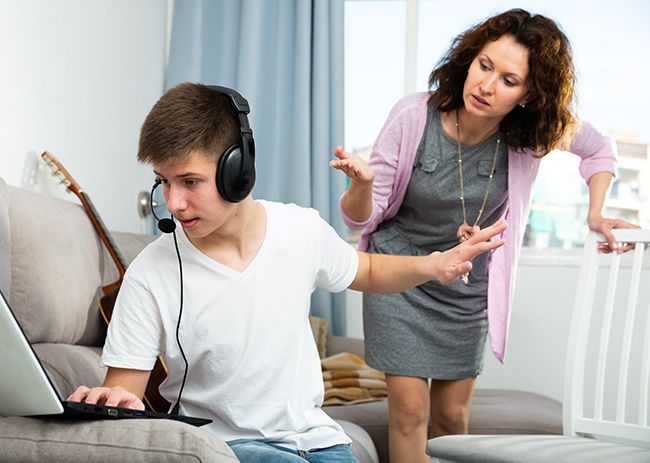Parents of teenagers will know how challenging it can be living with children of this age, as they go through puberty and become young adults.
All those hormones, school exams and the natural desire for more independence can make home life tricky to navigate. Now with the added restraints of the COVID-19 pandemic, both teens and parents are facing a tough time.
To understand more about teenagers' behaviour, HELLO! consulted expert Tish Feilden, Lead Therapist at the charity Jamie's Farm and author of Creating Change for Vulnerable Teens.
MORE: Tess Daly and Vernon Kay's top parenting secret revealed
WATCH: How to manage anxiety in the pandemic
Jamie's Farm runs five farms in England, which offer residential stays to disadvantaged and vulnerable children and teenagers, enabling them to thrive academically, socially and emotionally.
Tish says: "Parenting teenagers is tough; we can feel rejected and confused. But beneath the mask of indifference, teenagers are often struggling. They feel anxious, confused, and crave acceptance. They simply cannot untangle this web of conflicting feelings to tell you how they feel.
"The best we can do is tell them we may not like their behaviour, set clear expectations on what we find acceptable or not, but say we still love them. We need to avoid character assassination or they feel they have nothing left to lose and can then behave to fulfil our worst expectations.
"Keep trying to understand and don't worry if they reject your attempts, as deep down they will have registered that you care. Even if they don't like them themselves, it is important that you still love them and believe in them."
Here, Tish looks at 6 common teenager behaviours and how parents can help…
The moody blues
Imagine you are feeling crushed by pressures from all sides of your life. That is often how it feels to be a teenager.
There is school pressure, peer pressure, identity issues and home pressure. Managing social media can be a full-time job. They often feel they are failing on all fronts, and yes, that can make them grumpy. Often, they feel under the microscope all day. How do I look, what should I say, what should I do?
Anything said or done can become public property in an instant. Shame is around every corner, the worst of all emotions. It is toxic, like a long-lasting hangover you cannot shift. I do believe it is tough being a teenager, as well as being their parent.
MORE: The 41 coolest Christmas gift ideas for tricky teenagers
Many couples show their worst side to each other that no friends see. It is the same with teenagers, especially if they feel secure with you - it allows them to let off steam, reveal the self beneath the mask that they hold out there in the world.
They can be moody and grumpy with us but know hopefully we will keep on loving them. Friends come and go, but we are in it for the long run.
We need to hold the faith in our children while they are wobbling. They rely on us to be the adult in the relationship and maintain some positivity. In listening to over 3000 children, I have yet to meet one who does not love their parents, while often admitting they never show it!
Teenage tantrums
Storming and shouting one minute, leaving you feeling emotionally battered, then 30 minutes later asking or money and permission to go out and see friends. Have you heard yourself think or say, 'Hang on a minute, you were yelling at me a minute ago when I asked you to tidy up your room? Why should I now do you a favour?'
It is hard to believe, but their minds can move on before we do. Teenagers, like small children, compartmentalise, they think more in black and white. They don't respond well to reasoning.
Sometimes clear boundaries and expectations work better, especially if we can deliver them with calm. If we shout, we don't have a leg to stand on saying don't shout at me!
The key is finding your strategies to de-escalate storms and rages and not to join in. Children learn more from what we do than what we say. Model the behaviour you want in return.
MORE: Best hand sanitisers your kids won't lose - and ones without methanol
Shutting us out
Teenagers find it hard to show or know what they need, and it is changeable by the minute. This makes it mighty hard to get it right as an adult, but maybe that's ok as there is no such thing as a perfect parent - just as no two children are alike.
If we can show it is ok to be wrong, but we are still willing to try, we demonstrate not giving up. Our teenager's door may be shut to us now, but not hopefully forever. We need to not feel a victim to our children. If possible, stay strong, and keep trying to build bridges.
Sometimes it may take speaking to the closed door and say: 'I am guessing you want some privacy, but I am concerned you are feeling down. I would love to understand, and if helpful, listen. Maybe what you need is peace, so it's ok for us to just hang out. You might need to give me clue when you feel like talking.'
It is always better to try and fail, than not try at all.
Pushing boundaries
Teenagers are driven by their will power. They are impulsive, reactive, and not usually very patient! If they want to do or have something, they are not often open to reasoning.
That is not because they are selfish, stubborn, or illogical – it's because their brain is wired so that the part that governs impulses is more active and takes over from the part that looks after reasoning and logic. They find it hard to climb down from high emotion.
Their priorities are different from ours Having that new pair of trainers may mean more in terms of their self-esteem in the peer group, than anything we can say. Going to that party may feel to them like life or death, but to us, it is just another excuse for late-night or avoiding homework.
It makes it hard for us as adults, as our words often fall on stony ground. Lecturing is a waste of breath and pushes us further apart. What they do respond to is clarity.
You could try saying: 'No means NO. Yes, that is hard. I understand that you are disappointed/frustrated/ upset. I am not going to pulled into an argument.'
If at all possible, stay calm, hold your ground and walk away from an argument. Say: 'I am willing to talk about this when we both feel calmer but don't want to fight.' It is all too easy to fan the flames on their fire! After all, we are the adult and they are the child, even though they sometimes act as if they are all-knowing all-seeing.
Technology and teenagers
Teenagers have said to me they wish their parents would set a boundary for phones at night and then they might get to sleep. They want us to take control. They cannot resist temptation and the consequence is lack of sleep.
Sleep is of primary importance to their wellbeing, to their ability to concentrate, think and their physical and mental health. That is why sometimes teenagers sleep for hours at weekends - their brains are like batteries needing to recharge. It is normal, not lazy!
Are we constantly on our phones? Do we let work, friends, our social media distract us? The best way we help them is to help ourselves and create house rules. Getting back to family mealtimes with no phones brings many gains in communication and contact.
Ban phones after a certain time at night to let their brains settle for sleep. In the long run, they will thank you for protecting them. Giving free access to phones for children can be like giving them a firearm; they do not know how dangerous it can be.
Putting friends before family
Does your teenager refuse to come and join in family activities? Do they walk down the street behind you?
Don't be offended. It is not personal. They are trying to fulfil the developmental task of their age group: separation. They know they need to move towards independence and looking at what being an adult means in terms of overall responsibilities is scary.
A hidden part will at times still want to be little, looked after and safe. The 'I don't want to be seen with you' version of themselves is temporary and not about you, but about their own insecurities.
Teenagers are looking for their tribe, their identity group. They yearn to be popular, to feel loved - but they hide vulnerability. Their social brain is overactive and keeps all these worries at the forefront of their minds overriding their concerns for us.
The best we can do is understand and not create another layer of difficulty for them, trusting that the child you love still exists beneath their grumpy defence. Keep asking them to join in and sometimes you will be pleasantly surprised.
Creating Change for Vulnerable Teens by Tish Feilden, £13.46, Amazon













